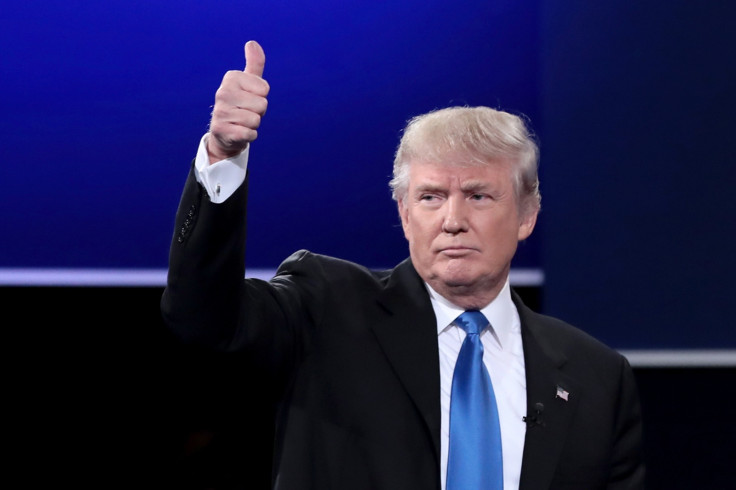Trump's gibberish on 'the cyber' shows he has no idea about the internet
From a '400 pound' DNC hacker to his 10-year-old son: What is Trump on about?

On the topic of cybersecurity, republican presidential candidate Donald Trump appears to be making it up as he goes along. When asked by the media, he still calls it "the cyber" and repeatedly descends into long-winded tirades about the vague dangers of the internet.
During the 2016 presidential debate with Hillary Clinton in New York this week (26 September), mere days after his luxury hotel chain was fined $50,000 (£38,000) for numerous data security blunders, he uttered a slew of cyber-tinged whoppers.
In the space of minutes, he had pondered how the Democratic National Committee (DNC) may have been hacked by a "400 pound" person sitting on a bed and claimed his 10-year-old son was evidence of how the so-called cyberwar is unwinnable.
He said the Islamic State (Isis) was beating the US when it comes to online-based operations and asserted his country should "be better than anybody else" because it invented the internet. He declined to discuss the involvement of Russian intelligence in recent hacks while blaming President Obama for the rise of state-sponsored adversaries.
The US political system has come under a constant barrage of hacks and leaks this year – the most alarming of which includes the infiltration of the DNC in July. Multiple cybersecurity firms have concluded that two Kremlin-linked groups were involved and tens of thousands of internal emails have since ended up online for the world to see.
It's on this topic where Trump comes the closest to having a legitimate stance: that it's almost impossible to attribute a major hack with ultimately certainty. "She [Clinton] is saying Russia, Russia, Russia. Maybe it was. It could also be China, it could be someone sitting on their bed that weighs 400 pounds. You don't know who broke into DNC," he said.
However, the run didn't last long. "Whether it was another country, we don't know, under President Obama we've lost control of things that we used to have control over. We came in with an internet, we came up with the internet," he added. Hmm, an extremely rudimentary form from the 1950s perhaps, but as for the internet we all know today — Tim Berners-Lee might have something to say about that.
Other gems included:
"I have a son. He's 10 years old. He has computers. He is so good with these computers, it's unbelievable. The security aspect of cyber is very, very tough. And maybe it's hardly do-able. But I will say, we are not doing the job we should be doing, but that's true throughout our whole governmental society."
"Look at the mess that we're in. Look at the mess that we're in. As far as the cyber, I agree to parts of what Secretary Clinton said, we should be better than anybody else, and perhaps we're not."
"I think Secretary Clinton and myself would agree very much, when you look at what Isis is doing with the internet, they're beating us at our own game. Isis. So we have to get very, very tough on cyber and cyber warfare."
Compared to his past statements on the topic of cybercrime, the debate was almost tame. Back in March, in an interview with The New York Times, Trump branded the United States "obsolete" in cyber, despite the National Security Agency (NSA) employing some of the most advanced – and well-funded – hackers on the planet.
"We're so obsolete, we just seem to be toyed with by so many different countries," he said at the time. "Certainly cyber has to be a, you know, certainly cyber has to be in our thought process, very strongly in our thought process. Inconceivable that, inconceivable the power of cyber."
In July this year, at the Republican National Convention, he claimed the US was "under cyberattack". When asked if he would use a cyberweapon before using military force, he replied: "Cyber is absolutely a thing of the future and the present. Look, we're under cyberattack, forget about them."
And in perhaps his most famous remark to date, taken from a town hall appearance, he declared that "the cyber is so big" in response to a question about combatting the Islamic State. "It's becoming something that a number of years ago, a short number of years ago, wasn't even a word," he claimed.
Not paying attention to digital security can have serious consequences. The biggest question now for those concerned about the national security of the US is can the business mogul and potential US commander-in-chief be convinced to pay attention?
© Copyright IBTimes 2025. All rights reserved.






















